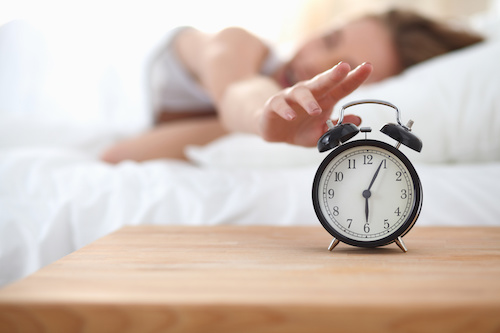
How Much Sleep Do You Need by Age
Adults between the ages of 18 to 64 need seven to nine hours of sleep per night. Take a look at how much sleep the Center for Disease Control and Prevention currently recommends depending on age:
| Age |
Amount of Daily Sleep Needed |
| 0 to 3 Months | 14 to 17 Hours |
| 4 to 12 Months | 12 to 16 Hours per 24 Hours (Including Naps) |
| 1 to 2 Years | 11 to 14 Hours per 24 Hours (Including Naps) |
| 3 to 5 Years | 10 to 13 Hours per 24 Hours (Including Naps) |
| 6 to 12 Years | 9 to 11 Hours per 24 Hours |
| 13 to 18 Years | 8 to 10 Hours per 24 Hours |
| 18 to 25 Years | 7 to 9 Hours per Night |
| 26 to 64 Years | 7 to 9 Hours per Night |
| 65+ Years | 7 to 8 Hours per Night |
If you look at this list and realize that you don’t get your recommended hours of sleep, you aren’t alone. According to the Center for Disease Control and Prevention, adults throughout all age ranges, genders, and geographic locations receive less than their recommended amount of sleep.
However, the key is to not sweat the small things if one night you don’t get your recommended amount of sleep. The average is what’s most important, and simply being aware of the number of hours you need based on your specific age is a great place to start.
Why We Sleep
When it comes to determining an exact reason why sleep is important to humans, it is still a mystery to scientists, but we do know that sleep is crucial to our survival. Scientists have developed a couple of theories as to why we require sleep:
- The Restorative Theory: This is the idea that sleep helps us to “restore” what we have lost while we are awake. Sleep provides an opportunity for our bodies to repair themselves.
- The Brain Plasticity Theory: This theory has gained traction over the past few years. The theory focuses on how sleep helps our brains to reorganize themselves. One of the examples often cited is the impact sleep deprivation has on your ability to learn and perform tasks.
Sleep Deprivation Side Effects
Persistent sleep loss has a direct and negative impact on our health and lives. Here are three of the most common side effects:
Impaired Memory: According to the 2019 Alzheimer’s Disease Facts and Figures Report, persistent sleeplessness can accelerate cognitive aging and put people at risk for dementia.
Increased Depression and Anxiety: The Journal of Cellular and Molecular Medicine explains that “Currently, the problem of sleep disturbance has plagued nearly a quarter of the world’s population. People who suffer from sleep problems throughout the year are more likely to have mental disorders such as bipolar disorder, generalized anxiety disorder, suicidal ideation, and especially depression.”
Compromised Immune System: Sleep impacts your immune system. Getting enough quality sleep and staying healthy go hand in hand. Without the right amount of rest, our bodies cannot fight off infections, inflammation, or stress. On average, adults need seven to nine hours of sleep to strengthen their immune systems.
7 Tips to Improve Your Sleep
Getting an adequate amount of sleep based on your specific age helps to start your day off on the right foot when it comes to your memory quality, mental health status, and ability to fight off illnesses. Here are a few proven tips we’ve tried, be sure to share in the comments what works best for you:
- Create a new bedtime routine.
- Limit the amount of blue light screen time after dark.
- Avoid late afternoon naps.
- Wake up and turn in around the same time every day.
- Adjust your bedroom temperature. Studies show that setting your thermostat to around 70°F is a comfortable temperature for most although it does depend on your preferences and habits.
- Treat your bedroom to some relaxing upgrades.
- Place anything you might need nightly, such as your CPAP equipment or a glass of water, on your nightstand to avoid any last-minute runarounds.




